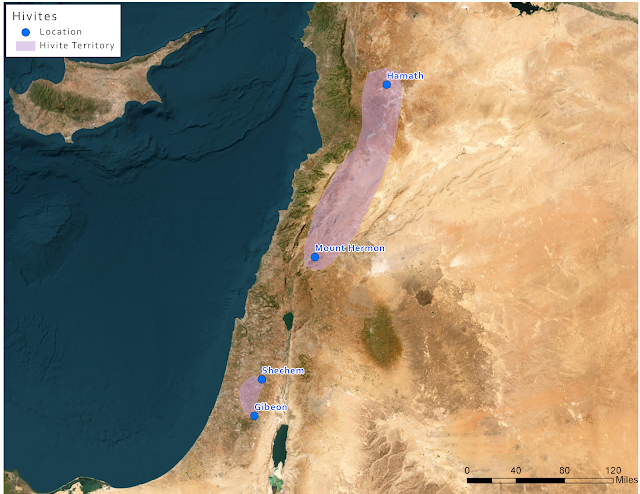Biblical Nations - Hivites
We cruised past 130,000 hits last week - thank you all, and let's keep pushing towards 150k!!
Hivites
Key Scripture: Exodus 23:22-24
Figures: Shechem, Hamor, Oholibamah
This week's subject is somewhat different from the rest of the people groups who lived in the Promised Land, as all of the named Hivite individuals come from Genesis rather than the time of Joshua. They did play an important role during the war of conquest, however, but while their cities were identified we are not given the names of any specific people. Over time, the Hivites were connected to various locations within the region where the twelve tribes would settle, and in particular their cities would eventually be settled by Benjamin, Ephraim, and Manasseh (interestingly, these are the three tribes descended from Jacob's younger wife, Rachel). But they were also said to have possessed regions to the north, including portions of modern Jordan and Syria, and according to one theory may also be linked to a group that settled farther south between the Dead Sea and Midian.
Like the other nations we have studied recently, the Hivites were descendants of Ham's son, Canaan. Historians have argued about their identity, with some saying that their name merely indicates "tent dwellers" and others associating them with the Hurrians who controlled the region between the Hittites and Assyrians during the Bronze Age. Their first recorded encounter with the Hebrew people was decidedly unfortunate as Shechem, the son of the ruler of a Hivite city that shared his name, raped Jacob's daughter Dinah. Attempting to pacify the situation on behalf of his son and secure Dinah as Shechem's wife, this ruler named Hamor met to negotiate with Jacob and all of his sons, who tricked him into having all the city's males circumcised before Simeon and Levi attacked and slaughtered them all. The women, children, and possessions of the city were all plundered, and God almost immediately called Jacob to move his family to Bethel. Shechem, lying in the valley between Mount Ebal and Mount Gerazim, would later be an especially important city throughout Israel's history as their first unofficial capital, a city of refuge, and eventually the center of worship after the Babylonians destroyed the Temple.
Related to the opinion that the Hivites and Hurrians were the same race is the view that the people group known as the Horites in Scripture is identical, and this group is one that settled in Seir to the south of the Dead Sea. Supporting that hypothesis is the fact that one of Esau's wives, named Oholibamah, was also a Hivite who bore him three sons, and it is possible that he took his wife from among the local inhabitants either before or during the process of dispossessing the Horite/Hivite inhabitants. Note that I have corrected an errant sentence from a couple of weeks ago, which resulted from a misreading that his first two wives were from the Hittite line, rather than one each from the Hittite and Hivite people groups.
It was not until after the Exodus from Egypt that Israel once again encountered this group, and it was another moment of deception between the two groups. Recognizing the supernatural forces at work during the destruction of Jericho and Ai, the Hivite residents of Gibeon sought to establish a treaty with the invading army under Joshua's command. Wearing tattered clothing and carrying old, stale provisions, they tricked the leaders into believing they had come from a foreign land, which would allow them to establish peaceful relations without fear of being annihilated. Israel's elders agreed, but once the deception was discovered they forced the Gibeonites into forced labor. They did honor their treaty, however, and defended the city when it was threatened by a coalition force of five armies. Besides those residents of Gibeon, however, other Hivites were allowed by God to remain in the Promised Land as a test for His people. In the north, their territory stretched from Mount Hermon to Hamath. During the reign of David they were included in the census count of Israel's residents, but by the time of Solomon their remaining offspring had also been relegated to forced labor in order to build the Temple in Jerusalem. Neither the Hivite nor the Horite names appear in Scripture after that point, not even during the time of Nehemiah when the other six Canaanite people groups are listed, which means they were either absorbed into the surrounding people groups or simply had ceased to exist by then.



Comments
Post a Comment